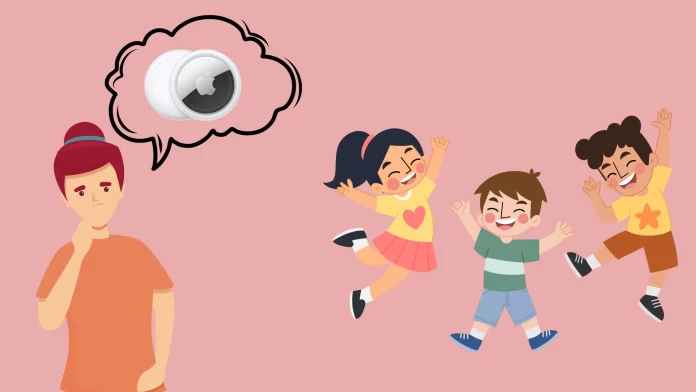So, you’ve heard of Apple’s AirTag, right? That tiny, shiny disc that promises to keep your valuables from going MIA. But hold on a sec—what if that “valuable” is your kiddo? Yeah, you read that right. Parents are slipping AirTags into junior’s backpack, and the debate is heating up like a smartphone left in the sun.
Apple’s saying, “Hey, not so fast!” Experts are scratching their heads and parents? Well, they’re all over the map. Some are saying it’s the best thing since sliced bread for keeping tabs on their tots. Others argue it’s a slippery slope to becoming that dreaded “helicopter parent,” hovering over their kids like they’re fragile china.
Apple’s Stance: Not for Kids
When Apple launched AirTags, they were crystal clear about one thing: these tiny trackers were designed for objects, not people. The tech giant has been vocal about discouraging parents from using AirTags to monitor their kids. It’s not just a casual suggestion; it’s a firm stance backed by official warnings. Apple’s not playing around here; they’re laying down the law.
But why is Apple so adamant? Well, let’s talk about the anti-stalking features built into these devices. AirTags are engineered to alert nearby iPhones if they detect an unknown tag moving with them. So, if you’re being followed, your phone will give you a heads-up. Sounds great for adults, but it’s a different ball game for kids, especially those too young to own a smartphone. Without a phone to alert them, children wouldn’t know they’re being tracked, whether by a parent or, heaven forbid, someone with ill intentions.
So, Apple’s caution isn’t just corporate jargon; it’s a serious call to consider the implications and limitations of their technology. They’re essentially saying, “Look, we’ve built this cool gadget, but it’s not a one-size-fits-all solution, especially not for tracking your kids.”
The AirTag Dilemma: Trust and Freedom
Alright, let’s flip the script and talk about the not-so-rosy side of AirTags. First off, trust. You know, that thing that takes years to build and seconds to shatter? Slipping an AirTag into your kid’s backpack without a heads-up could be the emotional equivalent of stepping on a Lego—painful and totally avoidable. It’s not just about you playing detective; it’s about your kiddo feeling like they’re not under constant surveillance.
And let’s talk about freedom—the freedom to explore, to make mistakes, and to learn from them. Remember your own childhood? The scraped knees, the hide-and-seek games, the sense of adventure? Those experiences shaped you. Constant tracking could rob your child of those formative moments. It’s like putting them in a bubble; sure, they’re safe, but they’re missing out on the real world.
What’s more, tracking your child’s every move could set a dangerous precedent. Today it’s an AirTag, but what about tomorrow? Will you monitor their texts? Their social media? Where does it end? It’s a slippery slope, and before you know it, you could be deep into helicopter parent territory, hovering so close that you’re stifling their growth.
So, if you’re toying with the idea of AirTags for your little ones, you’re not just making a quick tech choice; you’re making a long-term family call. This isn’t like choosing between streaming services; it’s a decision that could echo in your family’s life for a good while. Heavy stuff, right?
Age Matters: The Right Time for AirTags
So you’re thinking AirTags are the go-to for the kiddos, huh? But hold on, you’re drawing a line in the sandbox. For the tiny tots who still think a cardboard box is the best toy ever, an AirTag is like a guardian angel in tech form. It’s not snooping; it’s safeguarding.
However, once they’re old enough to trade Pokémon cards and have playdates, that’s a different ballgame. They’re not just kids; they’re mini-explorers, venturing out into the big, wide world. And let’s be real, slapping a tracker on them at this stage is like clipping a bird’s wings. Sure, they’re safe, but at what cost?
So, if you’re in the parent hot seat, mulling over the AirTag dilemma, maybe this perspective could be your North Star. It’s not just about age; it’s about life stages. And as they grow, your approach needs to evolve. Because parenting isn’t just about bubble-wrapping your kids; it’s about giving them the tools to navigate life’s ups and downs. And sometimes, that means loosening the reins a bit.
Conclusion: To Tag or Not to Tag
So here we are, at the end of the rabbit hole, still wrestling with that gnawing question: AirTag your kiddo or not? It’s not as simple as flipping a coin; it’s more like solving a Rubik’s Cube. Sure, AirTags can be a godsend in a pinch—like finding your lost child in a sea of faces at a theme park. But let’s not gloss over the thorny bits—the trust cracks, the “what-ifs” of misuse, and the murky waters of ethics and law.
If you’re a parent on the fence, here’s the skinny: Do your homework. Don’t just listen to Apple or the nightly news; dig into what the child psychologists and legal eagles are saying. And hey, maybe even have a heart-to-heart with your kid. They’re the VIP in this scenario, right?
Bottom line: The ball’s in your court. If you go the AirTag route, know that it’s not all smooth sailing; there could be choppy waters ahead. And if you give it a hard pass, no sweat. There are other ways to keep tabs on your young’uns without resorting to high-tech tracking.
So, tag or no tag, the endgame is the same: keeping your kids both safe and free. It’s like juggling flaming torches; tricky, but not impossible. And that, folks, is the real challenge.






